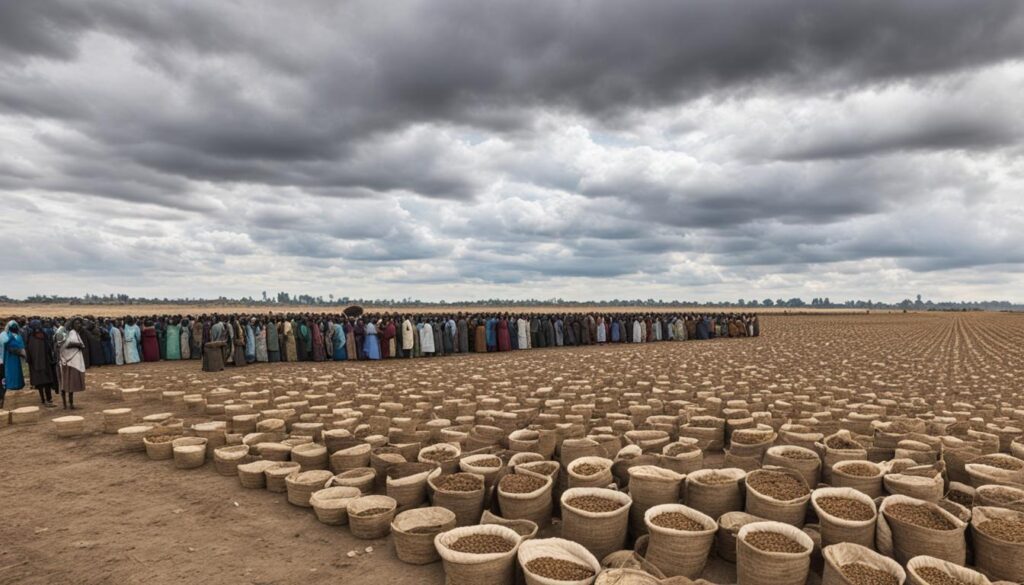During tough economic times, the human spirit has shown resilience through charitable giving. The act of giving from one’s own resources to help those in need is an expression of kindness, compassion, and generosity that transcends societal barriers. The philanthropic instincts in individuals have played a crucial role in alleviating suffering and providing support for the vulnerable.
Philanthropy, rooted in the desire to make a positive impact on society, encompasses a wide range of charitable activities. From donating money and resources to volunteering time and expertise, philanthropists aim to address social, environmental, and economic issues. Their contributions can fund research, promote education, provide healthcare, support the arts, and much more.
In times of scarcity, when resources are limited and needs are heightened, charitable giving becomes even more critical. It is during these challenging periods that the true character of individuals and communities emerges. The mindset of scarcity, characterized by a belief in limited resources and a fear of not having enough, can either hinder or inspire generosity. This article explores the concept of giving from a place of scarcity, the transition to abundance, and the profound impact it can have on both the giver and the recipient.
Key Takeaways:
- Charitable giving is an essential act of kindness and compassion.
- Philanthropy encompasses various ways to make a positive impact on society.
- Generosity becomes more crucial during tough economic times.
- The scarcity mindset can either hinder or inspire charitable giving.
- Giving from a place of scarcity can bring about a profound transformation.
The Scarcity Mindset and the Paradox of Wealth
The scarcity mindset, characterized by the fear of not having enough time or resources, can affect individuals across all levels of wealth. It is a paradoxical phenomenon that even those with significant wealth can succumb to the scarcity mentality. Instead of relying on their abundance, these individuals may become consumed with the fear of scarcity, leading them to prioritize material provision over trust in a higher power.
Despite having tremendous resources at their disposal, families with immense wealth can find themselves trapped in a cycle of scarcity thinking. The pursuit of accumulating more wealth and possessions becomes a way to alleviate their anxieties and fears. However, this only further entrenches their scarcity mindset, as they continuously strive for more, believing it will provide them with security and fulfillment.
But wealth alone does not guarantee a sense of abundance. In fact, the relentless pursuit of material provision can deepen the scarcity mentality, causing individuals to place their trust solely in their own resources and abilities. This paradox of wealth highlights the need for a shift in mindset – from scarcity to abundance.
Biblical narratives offer powerful insights into this shift. Take, for example, the story of Jesus feeding the five thousand. In the face of limited resources, Jesus demonstrates that abundance can be attained through faith. By trusting in God’s provision, Jesus transformed scarcity into abundance, providing enough food to satisfy the multitude.
Another example is the story of the widow of Zarephath. In the midst of a severe drought and famine, the widow’s act of faith in giving her last bit of flour and oil to the prophet Elijah resulted in God’s provision never running dry. Her willingness to give out of scarcity demonstrated trust in God’s ability to provide for her needs.
“And Elijah said to her, ‘Do not fear; go and do as you have said. But first make me a little cake of it and bring it to me, and afterward make something for yourself and your son. For thus says the Lord, the God of Israel, ‘The jar of flour shall not be spent, and the jug of oil shall not be empty, until the day that the Lord sends rain upon the earth.”” – 1 Kings 17:13-14
These stories challenge us to reevaluate our perspective on wealth and provision. While material possessions have their place, true abundance comes from trusting in God’s provision rather than relying on our own efforts. It is a shift from scarcity thinking to recognizing the infinite resources available to us through our relationship with God.
The scarcity mindset and the paradox of wealth remind us that true abundance lies not in accumulation, but in the ability to trust in God’s provision. By embracing this mindset, we can experience a sense of contentment, peace, and generosity that transcends material wealth.
The Importance of Joyful Giving
The Bible teaches us the significance of joyful giving, highlighting the importance of our heart and motivation behind charitable acts. It is not solely about the act of giving, but also about the intention behind it. When we give out of scarcity, it becomes a powerful statement of faith and our trust in God’s provision.
When we face financial challenges or limited resources, it is natural to feel hesitant about giving. However, trusting in God and choosing to give cheerfully, even in times of scarcity, demonstrates our belief that God is more valuable than money or material possessions.
As the apostle Paul wrote in 2 Corinthians 9:7 (NIV), “Each of you should give what you have decided in your heart to give, not reluctantly or under compulsion, for God loves a cheerful giver.” Giving joyfully, even when resources are limited, allows us to put our trust and faith in God’s provision, knowing that He will supply all our needs according to His riches in glory.
The Heart of a Cheerful Giver
A cheerful giver is someone who gives with an attitude of gratitude, joy, and trust in God. This type of giving is not driven by obligation or pressure, but rather by a deep understanding of God’s faithfulness and desire to bless us.
“God is not unjust; He will not forget your work and the love you have shown Him as you have helped His people and continue to help them.” – Hebrews 6:10 (NIV)
When we give from a place of scarcity, we demonstrate our trust in God’s provision and recognize that He is the source of all blessings. Moreover, we experience the joy that comes from participating in God’s work and being a blessing to others.
Trust in God’s Provision
Trusting in God’s provision requires us to let go of our fears and worries about scarcity. It means fully believing that God can multiply what little we have and use it for His glory.
Jesus Himself demonstrated the power of trusting in God’s provision when he fed the five thousand with just five loaves of bread and two fish. Despite the scarcity, Jesus trusted in God’s ability to provide, and the result was an abundance that exceeded what was initially available.
Summary:
The importance of joyful giving cannot be understated. It is not about the amount we give, but rather about the condition of our hearts and our trust in God’s provision. Giving cheerfully from a place of scarcity is a testament to our faith, demonstrating that we value God more than earthly wealth. Let us remember the words of Proverbs 11:25 (NIV): “A generous person will prosper; whoever refreshes others will be refreshed.”
The Community of Goods in Early Christianity
The early Christian community in Jerusalem practiced a form of communal sharing known as the Community of Goods. Inspired by Jesus’s teachings, they voluntarily pooled their resources to support one another, especially the poor and widows.
This communal approach was a response to Jesus’s call to care for one another and ensure that no one went without basic needs.
Voluntary Sharing and Support
Within the early Christian community, the act of sharing resources was not driven by obligation or compulsion but by a genuine desire to support one another. This sense of community was grounded in the teachings of Jesus, who emphasized the importance of caring for the vulnerable.
“Sell your possessions and give to the poor.”
This quotation from Jesus’s teachings in Luke 12:33 highlighted the radical nature of communal sharing and the responsibility the early Christians felt to meet the needs of those less fortunate.
Prioritizing the Poor and Widows
One of the notable aspects of the Community of Goods was the intentional focus on supporting the poor and widows within the community. In the Bible, widows were considered a vulnerable group that required special care and attention.
This shared responsibility enabled the early Christian community to provide for the basic needs of those who were struggling financially, ensuring that everyone had access to food, shelter, and other essentials.
A Response to Jesus’s Call
The Community of Goods in early Christianity was not simply an act of charity but a tangible expression of love and obedience to Jesus’s teachings. By pooling their resources, the early Christians exhibited a deep commitment to caring for one another and met the needs of their community members.
This communal approach set an example for future generations, reminding believers of the importance of community sharing and providing a blueprint for how to support one another in times of need.
References
- Acts 2:44-45
- Acts 4:32-35
The Great Famine and Charitable Relief Efforts
The Great Famine, a devastating period of food shortages that affected the Roman Empire, spurred the early Christian community into action. Anticipating famine, their Christian response was marked by a united effort to provide relief to those in need. The church in Antioch, upon receiving a prophetic warning about the impending famine, mobilized their resources and collected funds to support the church in Jerusalem. This act of charity exemplified their deep concern for one another and their willingness to help in times of crisis.

As the famine loomed, the Christian community recognized the urgency and dire consequences their fellow believers would face without assistance. Their relief efforts sought to alleviate the suffering caused by food scarcity and ensure that their brothers and sisters in faith were cared for. This collective response underscored the power of unity and the Christian commitment to assisting those in need.
“For I was hungry and you gave me food, I was thirsty and you gave me drink…” – Matthew 25:35
Charitable Relief in Action
The relief efforts put in place by the early Christian community were impactful and effective. Here is a breakdown of their actions:
| Actions | Results |
|---|---|
| Prophetic Warning and Call to Action | Early recognition of the imminent famine and a divine call to alleviate suffering. |
| Collection of Funds | The church in Antioch gathered financial resources to support the church in Jerusalem and provide relief. |
| Distribution of Aid | Assistance was provided to the affected individuals and communities to alleviate hunger and ensure necessities were met. |
| Community Support | The Christian community rallied together, demonstrating the power of unity in addressing societal challenges. |
This unified Christian response to the Great Famine showcased the compassion and selflessness that defined the early believers. It exemplified the importance of providing relief to those in need and the Christian commitment to love and care for one another.
Faith and Generosity in Times of Financial Hardship
Giving during financially tight times can be challenging, but it is a powerful act of faith. The Bible encourages believers to trust in God’s provision and not be controlled by the fear of scarcity. Generosity during hardship demonstrates a belief that God is greater than money and that His promises of provision are trustworthy. It is an opportunity to redirect one’s focus from earthly possessions to eternal rewards.
In Matthew 6:25-26, Jesus reassures his followers, saying, “Therefore I tell you, do not be anxious about your life, what you will eat or what you will drink, nor about your body, what you will put on. Is not life more than food, and the body more than clothing? Look at the birds of the air: they neither sow nor reap nor gather into barns, and yet your heavenly Father feeds them. Are you not of more value than they?” This verse serves as a reminder that our Heavenly Father cares for our needs, even in times of financial hardship.
Fear of giving can stem from concerns about not having enough for oneself and loved ones. However, when we choose to give, despite our fears, we demonstrate our trust in God’s provision and acknowledge His sovereignty over our finances. The act of giving allows us to surrender our worries and anxieties, relying on God’s faithfulness and abundance.
“Let each one give as he has decided in his heart, not reluctantly or under compulsion, for God loves a cheerful giver.” – 2 Corinthians 9:7
The Apostle Paul’s words in 2 Corinthians remind us that our giving should stem from a place of joy and gratitude, not from compulsion or guilt. Even amidst financial challenges, we can find reasons to give cheerfully, knowing that God is faithful to provide for our needs.
God’s Provision in Challenging Times
Throughout the Bible, countless stories remind us of God’s provision, even during times of scarcity. In the Old Testament, the prophet Elijah meets a widow from Zarephath who is preparing to eat her last meal before she and her son succumb to starvation. However, in an act of faith, Elijah tells her, “Do not fear; go and do as you have said. But first make me a little cake of it and bring it to me, and afterward make something for yourself and your son. For thus says the Lord, the God of Israel, ‘The jar of flour shall not be spent, and the jug of oil shall not be empty, until the day that the Lord sends rain upon the earth.’” (1 Kings 17:13-14)
This powerful story highlights the widow’s trust in God’s provision, choosing to believe in the prophet’s words and giving from her scarcity. As a result, her jar of flour and jug of oil miraculously do not run out, sustaining her and Elijah until the rain finally comes.
Redirecting Focus and Finding Contentment
Facing financial hardship can be disheartening, but through giving, we are reminded of the eternal perspective and the true source of our contentment. Rather than solely relying on material wealth, generosity shifts our focus to the things that truly matter. It allows us to participate in God’s kingdom work and invest in the lives of others.
Table: The Power of Generosity in Times of Financial Hardship
| Benefits of Giving During Financial Hardship | Scriptural Examples |
|---|---|
| Strengthens faith and trust in God’s provision | The widow of Zarephath (1 Kings 17:13-14) |
| Shifts focus from scarcity to abundance | The widow’s offering (Mark 12:41-44) |
| Brings joy and contentment despite financial challenges | The Macedonian churches’ generosity (2 Corinthians 8:1-5) |
| Participates in God’s kingdom work | The early Christian community in Jerusalem (Acts 4:32-35) |
In challenging times, our ability to give may be limited, but any act of generosity, no matter how small, makes a difference. It is an opportunity to rely on God’s provision, strengthen our faith, and demonstrate our love for others.

How Does Scarcity Impact Charitable Giving?
When it comes to charitable giving, scarcity shapes spending neuroscience in many ways. The perception of limited resources can drive people to prioritize urgent needs over long-term charitable contributions. This can influence decision-making and impact the willingness to donate to charitable causes.
How Can Charitable Giving Help Address Scarcity and Want?
Charitable giving is a beacon of hope in a world often marred by scarcity and want. By directing resources to those in need, philanthropy mitigates the harsh realities of scarcitydriven spending tips, allowing individuals to rise above immediate survival and pursue fuller, more enriched lives.
Conclusion
Charitable giving and generosity hold immense value, especially during challenging economic times. In this article, we have explored the concept of scarcity and abundance, emphasizing the need for a shift in mindset. The early Christian community’s example of sharing and support during the Great Famine provides inspiration for believers facing financial hardship.
Through joyful and faith-filled giving, individuals not only benefit those in need but also experience a transformative perspective and a deeper relationship with God. By choosing to give with a generous heart, even during tough times, individuals demonstrate their trust in God’s provision and show that their faith is not dependent on material possessions.
Charitable giving in times of scarcity brings communities together, promotes empathy, and affirms the belief that everyone has a role to play in supporting one another. By extending a helping hand to those in need, we can make a profound impact and contribute to the betterment of society.
FAQ
What is the scarcity mindset?
The scarcity mindset refers to the fear of not having enough time or resources, even among those with significant wealth.
How does the scarcity mindset relate to the paradox of wealth?
The paradox of wealth can amplify the scarcity mindset, as families with immense resources may rely more on material provision rather than trust in a higher power.
What does the Bible teach about joyful giving?
The Bible emphasizes that joyful giving involves not just the act of giving, but also the intention and motivation behind it.
How can giving out of scarcity be a statement of faith?
Giving out of scarcity is a powerful statement of faith and trust in God’s provision, demonstrating that He is more valuable than money and material possessions.
What was the Community of Goods in early Christianity?
The Community of Goods was a form of communal sharing practiced by the early Christian community, where they voluntarily pooled their resources to support one another, especially the poor and widows.
How did the early Christian community respond to the Great Famine?
The early Christian community mobilized and provided relief to those in need during the Great Famine, demonstrating their deep concern for one another and their willingness to help in times of crisis.
How does giving during financially tight times demonstrate faith?
Giving during financially tight times is a powerful act of faith, demonstrating a belief in God’s provision and a redirection of focus from earthly possessions to eternal rewards.
Why is charitable giving important during tough economic times?
Charitable giving holds immense value during tough economic times, as it not only benefits those in need but also transforms the giver’s perspective and relationship with God.

